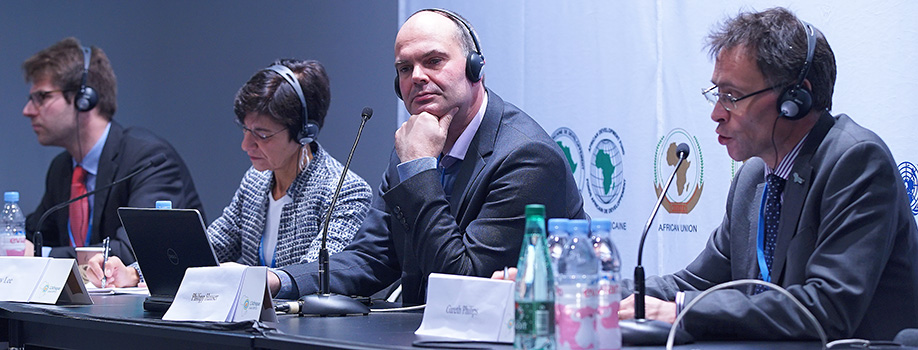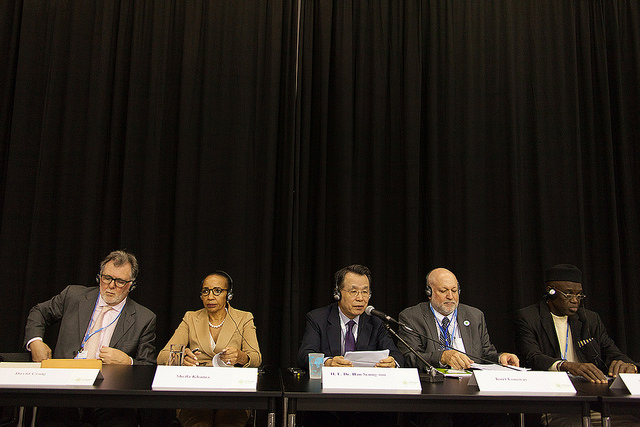
By Protus Onyango
African countries have been urged to start national carbon tax systems in readiness for carbon taxing regime.
Speaking on the 10th day of the UN climate change conference at the Africa Pavilion in Paris, France, experts discussing the Carbon Tax: A Catalyst for Regional Integration in Southern Africa called for regional cooperation to accelerate early action, attract immediate support and prepare the region for participation in more comprehensive global climate change market mechanisms and mitigation efforts.
According to Philipp Hauser of Project Development Forum, Clean Development Mechanism (CDM) is still the best for African countries unless they develop their national guidelines.
Under the ‘cap and trade’ principle, a maximum (cap) is set on the total amount of greenhouse gases that can be emitted by all participating installations. ‘Allowances’ for emissions are then auctioned off or allocated for free, and can subsequently be traded.
“Installations or businesses must monitor and report their CO2 emissions, ensuring they hand in enough allowances to the authorities to cover their emissions. If emission exceeds what is permitted by its allowances, an installation must purchase allowances from others. Conversely, if an installation has performed well at reducing its emissions, it can sell its leftover credits. This allows the system to find the most cost-effective ways of reducing emissions without significant government intervention,’’ Mr Hauser said.
South Africa’s innovative Carbon Tax proposal provides for the use of carbon credits from qualifying existing and new investments and therefore has the capacity to catalyse early action and stimulate economic development.
Meanwhile, other countries in the region, such as Swaziland, have made great strides in the area of renewable energy.
The discussion brought together South African Carbon Tax Scheme and the Swaziland Renewable Energy Plan and compared them to other regional initiatives and engage the audience in a discussion about the opportunities and obstacles that these Southern African approaches present.
Peter Janoska of the International Energy Agency (IEA) said energy causes 66 per cent of global emissions.
“The current policy scenario will lead to a temperature rise of 6 degrees centigrade scenario and the Cancun pledges, if fully implemented, translates into a 3.5 degrees centigrade scenario,’’ Janoska said.
He noted that most of the reductions and capital expenditures are required in non-OECD countries as they account for 90 per cent of population and energy demand growth.
“Cost is time dependent and increasing: Each US$ investment delay will cost 4.5 US$ investment in 2020. Though no direct link between markets expected before 2035, all systems will have access to offsets (indirect linking), leading to price convergence,” Hauser said.
Gareth Phillips of the African Development bank (AfDB) said if all countries begin immediate mitigation, establish a single global carbon price and use of all technologies, economic costs will be limited to 0.06 per cent reduction in annual consumption growth until 2100.
The speakers noted that with the exception of South Africa and the Mediterranean countries, per capita emissions of African countries are 50 times lower than a typical EU country and 100 times lower than those of a US citizen.
The Southern African Power Pool (SAPP) is a cooperation of the national electricity companies in Southern Africa under the auspices of the Southern African Development Community (SADC).
Its objectives include electrification of rural communities (Only 5% of rural areas have access to power), improved cooperation and relation of involved countries, creating strategies that will support sustainable development priorities and co-ordinate the planning of electric power.
“Under the CDM a sectorial baseline for the Southern African Power Pool was established and can help to promote substantial renewable energy potential. A lack of investments leads to suppressed demand and shortage of generation capacity, leading to outages and emergency power dispatch,” said Catherine Lee, of Lee International.










